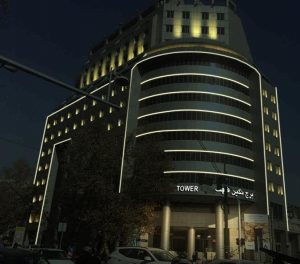Iran customs Law : part 1 – Organization of Iran Customs Administration
Organization of Iran Customs Administration
part 1 Chapter 2 – Goals, functions and organization of the Islamic Republic of Iran Customs Administration
Article 2: Islamic Republic of Iran Customs Administration is a governmental organization af filiated to the Ministry of Economic Affairs and Finance which as an economic border guard plays a coordinating and key role in the country’s entry and exit points, and it is responsible for exercising sovereignty of the government in the enforcement of Customs Law and other laws and regulations related to import, export and transit of goods, collection of import duties, customs duties, related taxes, technical requirements and facilitation of trade. Islamic Republic of Iran Customs Administration in order to perform its legal functions, shall determine the levels of its required administrative of fices without observing the requirements of divisions of the country and article (30) of Civil Service Management Law, proportional to the volume and the type of activities. Organization of the customs and administrative of fices shall, proportional to the functions and missions assigned by the Islamic Republic of Iran Customs Administration, prepared and after confirmation of the Minister of Economic Affairs and Finance shall be approved by the Council of Ministers. Islamic Republic of Iran Customs Administration consists of the headquarters of Iran Customs Administration and administrative customs .
Article 3
Functions and authorities of Iran Customs Administration shall be as follows:
a. Applying government policies on the export,import and transit of goods;
b. Assessment and collection of import duties and other legally receivable fees by the Iran Customs Administration;
c. Performing legal formalities of release, delivering the goods to its owner or his/her legal agent, examining the release documents in order to establish the authenticity of release terms and conditions of release and collecting deductions or refunding surcharges;
d. Controlling and supervising transit of goods through the territory of the country;
e. Implementing of laws and regulations related to border small markets, frontiers and peddlers;
f. Appling customs regulations on exemptions and prohibitions in sections related to outright export, temporary export, outright import, temporary admission, carriage of goods coastwise, internal transit of goods, trans shipment, boundary clearing transactions, duty free shops, political couriers and packages and international post;
g. Implementing of laws and regulations related to customs offences and smuggling, abandoned and seized goods;
h. Anticipating and providing the infrastructure needed to implement and deploy modern systems, procedures and practices, such as single
window in customs activities;
i. Collecting, analyzing and publishing statistics of the volume of imports and exports of goods;
j. Reviewing and recognizing barriers of customs system and planning towards removing them;
k. Commenting on the draft of customs-related plans, bills and decrees;
l. Adopting appropriate procedures for the conduct and administration of legal and judicial proceedings in relation to customs affairs;
m. Training of staff and supervising and inspecting actions and behaviors of customs staff, detecting their offences and administrative
faults;
n. Inspecting customs administrative of fices, supervising their functions and quantitative and qualitative organizing of entry and exit points;
o. Investigating and settling disputes arising from the implementation of the Customs Laws and regulations between the customs and the owner of the goods in accordance with related laws and regulations;
p. Developing international relations, concluding bilateral or multilateral agreements or memorandum of understanding, membership in and active interaction with international and customs organizations subject to Article Seventy Seven (77) of the constitution law and related laws;
q. Complying with the recommendations of the World Customs Organization, commercial contracts and concluded or clearing agreements within the framework of relevant laws and regulations;
r. Complying with the provisions of the law on the general policies of Article forty four (44) of the constitution law in order to assign non-sovereign customs affairs to private and cooperative sectors;
s. Using modern technologies and equipping customs premises with advanced equipments to increase ef ficiency and improve performing customs facilities;
t. Taking necessary measures to facilitate Trade Affairs, encourage goods exports and expand transit of goods;
u. Facilitating customs processes with a view to develop tourism;
v. Performing other customs functions under this law and/or other laws and regulations.
Article 4
a. The President of Iran Customs Administration is appointed by the Minister of Economic Affairs and Finance and as the highest executive authority of the customs in the framework of related laws and legal provisions, is responsible for administrating of customs affairs, proposing the organization and budget recruitment, staff appointments and dismissals, transfer them from an office to another one, representing the customs in all legal authorities with the right of substitution and referring to arbitration as necessary, and supervising proper implementation of the functions assigned to the customs under the auspices the Minister of Economic Affairs and Finance. His/her position is also equal to those of the authorities referred to in article 71(d) of Civil Service Management Law.
b. Deputies of the customs shall be appointed upon the proposal of the president of Iran Customs Administration and approval of the
Minister of Economic Affairs and Finance by decrees of the President of Iran Customs Administration.
c. As far as employment regulations are concerned, staff of the customs shall be subject to Civil Service Management Law and its subsequent amendments, and taking into account particular characteristics, importance and responsibilities of customs posts and their impact on revenue collection, they shall enjoy the advantage of job right tables referred to in article 65 of the mentioned law by a factor of 1-2. In order to provide human resources of administrating of fices, the customs may displace human resources, taking into account their degrees of education and experience and expertise, to take organizational positions. Additional financial burden arising from the implementation of this law shall be provided out of the proceeds aris-ing of this law.


